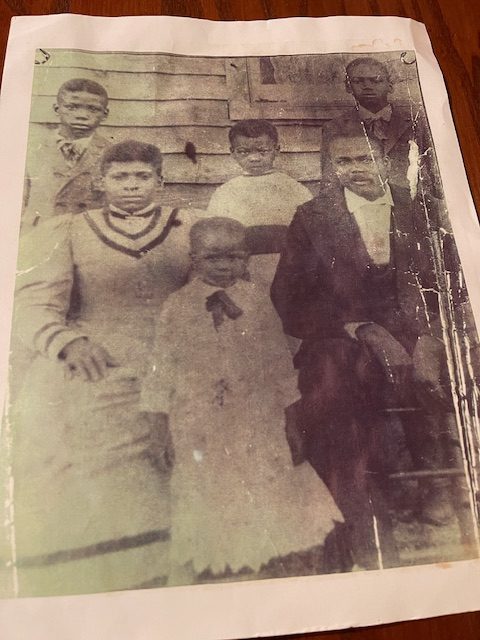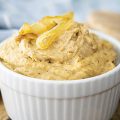
By Constance Garcia-Barrio
ABOVE PHOTO: This image, from the 1890s, shows Rose Wilson Ware, seated with her husband Jacob Ware, with their home in the background. Both a seamstress and an herbalist, she made her dress as well as the clothes her four children are wearing. The picture was probably taken by an itinerant photographer.
Photo courtesy: Constance Garcia-Barrio
From the skilled hands of my great-grandmother, Rose Wilson Ware, or Maw, as we called her, came herbal remedies from slavery time. Born into bondage around 1852 in Spotsylvania County, Virginia, Maw lived until 1965, 113 years. For Maw and many other enslaved African Americans, herbal medicine meant survival.
Herbal remedies continued to sustain Black folks after slavery had ended. “Herbs kept us alive, child,” my late mother, Cleoria Rose Coleman Sparrow, born on Maw’s farm in 1910, told me.
“There was one doctor for all of Spotsylvania County in those days, and it took some doing to get him,” my mother said. “You had to go miles to the telephone at the general store, then you would call Fredericksburg, and they relayed the message to him.”
Maw didn’t sit my mother down to teach her about herbs.
“Maw would tell me, ‘Fetch me some pine tags [needles].’ I would bring them back and then watch her make cough syrup with them,” my mother recalled. “You learned about making herbal remedies from being around them, like talking with a drawl.”
My mother got to see lots of Maw’s cooking and herb work because she had kitchen chores.
“I was afraid of the livestock, but Sis [her older sister, Coletha] wasn’t,” my mother said. “Sis handled the horses, cows and mules, but my job was to tend the stove, give it the right amount of wood. I was good at judging the stove’s temperature.”
Maw and her husband, Jake, share-cropped after freedom came. They saved up and bought a house in the 1870s near the plantation where they had grown up. Maw was a short, bosomy woman with brown eyes, dark brown skin and a hooked nose that bespoke Native American blood. Farming broadened her shoulders and hardened her arms. My mother, when she was small, often saw Maw plow with a mule. Firm-spoken and strong-willed, she had toughness that allowed her to hold on to the farm when she was widowed in her early 60s, no small feat with the Ku Klux Klan riding.
Maw’s remedies followed the rhythms of the seasons. In early spring she picked pipsissewa, and used the whole plant to brew a bittersweet tea. Everyone drank a quarter of a cup each night to cleanse the body and tone it for the months of farming ahead. In April, when sassafras overran the fields, it went quickly from the ground to the teacup. Maw would give it to the children with a drop of molasses to keep them stepping smartly while doing chores. Later in the spring a tea made with the flowers and seeds of the tansy plant would rid them of worms.
The pleasant-tasting leaves also settled an upset stomach.
During the warmest months, stomach remedies grew potent and plentiful. Maw used the mint that leapt up in July to calm queasiness. Calamus thrived in nearby ditches. Chewing it aided digestion.
Roses flourished on the farm in the midsummer heat, and Maw would use the flowers to make rosewater. Rosewater and lard were the chief ingredients in her homemade cold cream. Later in the year she used rose hips to make a tea that fought colds.
Summer might bring trouble like athlete’s foot, but it also brought the cure. The white liquid from the milkweed pod, when rubbed on the peeling foot, promoted healing. Dandelions were death to warts. Maw would bruise the stems and rub their liquid right on the wart.
Pennyroyal, rubbed on the skin, kept away mosquitoes. Pennyroyal kept away other things too. Maw and Aunt Alsie Ellis, the local midwife, believed that a woman who drank plenty of hot pennyroyal tea never had more babies than she wanted.
When fall colors rioted over the countryside, Maw would pick deep purple pokeweed berries. She used to pour whiskey over the berries and let them sit for months. By the time winter arrived, the whiskey-berry essence stood ready to fight pain in the joints. Maw soaked wild cherry bark in whiskey to make yet another such remedy. A few spoonfuls brought much relief.
A child might catch a bad chill on December trips to the kiln, a deep hole outdoors lined with straw and burlap and covered with boards to keep produce from freezing in winter. To cure a cold, Maw would steep red oak bark in hot water and have the child sufferer gargle with the liquid. It drew phlegm from the throat and eased discomfort.
Men mended harnesses and mixed feed for livestock indoors during the winter. The women sewed and talked while the children cut pieces of cloth for quilts and listened to Maw’s stories of haunts, spirits and eerie lights. When they got painful ear infections from colds, Maw would stuff corn silk into a pipe, light it, and blow smoke directly into the aching ear. Then again, she might heat a bag of coarse salt and hold it to the throbbing ear.
Yellow onions helped to clear up a congested chest. Maw chopped up the onions, stirred in lots of sugar or molasses, and let the mixture simmer in a pot for hours near the fire. The sick person would eat a cupful two or three nights in a row. Maw might also make a poultice by mashing more onions and then adding goose grease or mutton tallow. Rubbed on the chest, the mixture speeded recovery.
All through the winter, pine tags served to make a good cough syrup. Maw put them in scalding water and let them stand. She removed the needles, added molasses to the essence, and had a soothing potion. A tea made with dried mullein leaves and sweetened with honey also helped to stop hacking coughs.
With roots and leaves, barks and berries, Maw left me a legacy for all seasons.
Disclaimer: This article is intended for informational purposes only. It is not intended to replace or substitute for any medical advice. If you have specific concerns or a situation in which you require medical help, you should consult with an appropriately trained and qualified doctor or specialist. This article, its author, the newspaper and publisher are not responsible for the outcome or results of following any advice in any given situation. You, and only you, are completely responsible for your actions.

















Leave a Comment